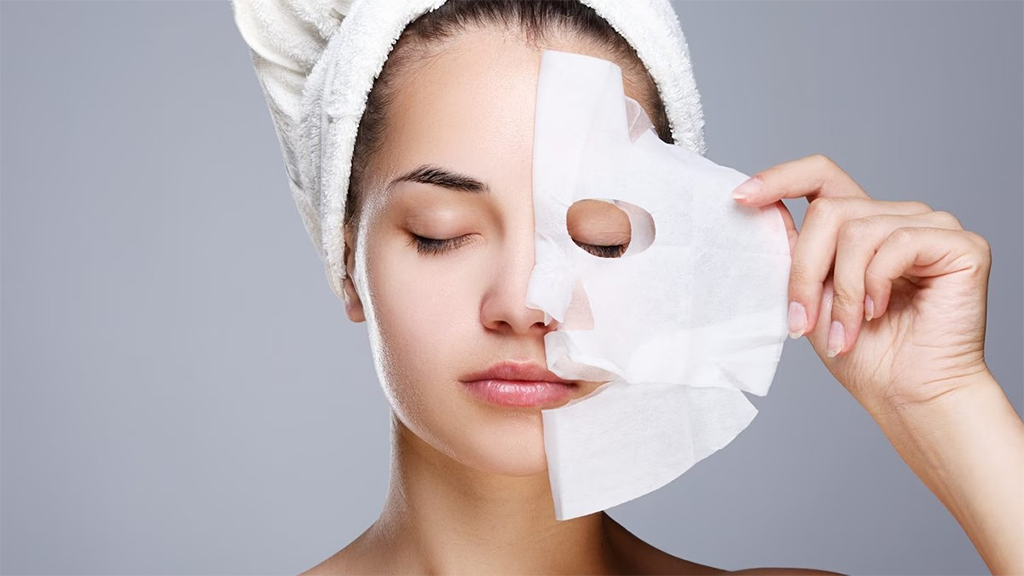One might imagine that face masks would be an overnight skincare fad. However, they add a whole new meaning to your beauty sleep. How? Well, your body heals and repairs itself while you sleep. At this point, your epidermal cells are also healing (1). For better healing, you must provide them with the most effective ingredients. There are many commercial night masks on the market, but if you’re more of a do-it-yourselfer and want to go natural, we have a list of easy DIY nighttime face masks you can try.
However, before you scroll down to the DIY section, you need to know what a nighttime face mask is. let’s find out
What is a face mask for the night? Is it different from normal face masks?
Overnight face masks are masks that you apply right before bed and only wash off when you wake up. The main goal of an overnight face mask is to boost hydration and help skin repair itself by nourishing it throughout the night.
You must leave these masks on your face overnight and wash them off the next morning. Nighttime face masks are also known as sleep masks and are readily available at beauty supply stores. However, if you want to use natural ingredients, you can try the night face masks mentioned in the next section for your face.

1. Coconut Oil Face Mask
Coconut oil is the superfood your skin needs when it’s dry and irritated. Applying coconut oil to your face can reduce transepidermal water loss, soothe your skin, reduce inflammation, improve hydration, treat sun damage, and prevent infection (2). However, if you have oily and acne-prone skin, you should stay away from coconut oil.
Instructions: Mix 1 teaspoon of extra virgin coconut oil or extra virgin coconut oil into your favorite night cream. Massage it into your face and wash it off the next morning.
Note: You can also apply coconut oil directly to your face without mixing it with other beauty products.
2. Watermelon Sleep Mask
Watermelon is not only refreshing, but also pampers your skin. Watermelon contains lycopene, which helps prevent skin damage from harmful free radicals (3), (4).
Preparation: Grate a cup of diced watermelon (the red pulp) and strain the juice. Apply it to your face with a cotton ball and let it dry before bed.
3. Face mask with turmeric and milk
Turmeric milk is a popular Ayurvedic remedy for many health conditions. It has antimicrobial and anti-inflammatory properties and acts as a powerful antioxidant that reduces acne and photoaging and improves alopecia and skin health (5). The lactic acid found in milk improves skin texture and firmness (6).
Preparation: Mix half a teaspoon of turmeric powder with a tablespoon of raw milk. Apply it to your face with a cotton ball just like you apply toner. Let it dry completely before going to bed. Be sure to use old pillowcases as turmeric can stain them.
4. Cucumber Face Mask
Cucumber is not only a superfood for your body, but also for your skin. Cucumber juice has a cooling effect on the skin. Not only does it increase skin’s moisture levels, but it also reduces inflammation, soothes sunburn, improves the appearance of wrinkles, and brightens your skin (7).
How to use: Extract the juice of half a cucumber and apply it to your face with a cotton ball.
5. Olive oil mask
Olive oil is rich in phenolic compounds (flavonoids and phenolic alcohols), linoleic acid, oleic acid, and other antioxidants that may promote skin rebuilding, reduce oxidative stress, and have anti-inflammatory effects (2).
How to use: Mix a few drops of extra virgin olive oil into your favorite night cream and massage onto your face.
Note: You can also apply olive oil directly to your face without mixing it into a cream

6. Face mask with aloe vera and vitamin E
Aloe vera contains antioxidants such as vitamins A, C and E, as well as amino acids, salicylic acid, lignin and enzymes. It reduces inflammation, promotes collagen synthesis, and protects your skin from the harmful effects of UV rays (8).
Instructions: Squeeze the oil out of a vitamin E capsule and mix with aloe vera gel. Apply to face and neck.
Caution: Before applying vitamin E oil to your skin, do a patch test to check if your skin is allergic to it.
7. Green tea and potato face mask
Green tea contains polyphenols, and topical green tea may help prevent UV-induced inflammatory responses and suppress oxidative stress (tested in animal and human models) (9). Potato juice, on the other hand, is good for oily skin. It can help prevent rashes, reduce acne breakouts, and nourish the skin (10).
How to prepare: Take a tablespoon of freshly brewed (and cooled) green tea and mix it with a teaspoon of raw potato juice. Apply the mixture to your skin with a cotton ball and leave it on overnight.
8. Almond Oil Face Mask
Natural oils are excellent emollients that help moisturize your skin and repair the skin barrier. Almond oil also has sclerosing properties and can help improve skin tone and complexion (11).
Instructions: Mix a teaspoon of almond oil (or sweet almond oil) with a tablespoon of fresh aloe vera gel. If you like, you can add a pinch of turmeric. Apply the mixture to your face, let it dry and go to sleep.

9. Face mask with jojoba oil and tea tree essential oil
Jojoba oil and tea tree oil have anti-inflammatory properties. Jojoba oil can help reduce skin infections and delay skin aging (12). Tea tree oil can help treat acne and other skin infections due to its high antioxidant activity (13).
How to use: Mix 2-3 drops of tea tree essential oil with a teaspoon of jojoba oil and apply to your face. Make sure you do a patch test before using tea tree oil. If you are allergic to tea tree oil, avoid this mask.
10. Rosewater and Chamomile Mask
By rose water we mean rose distillates or rose hydrosol. Rose water (along with other plant extracts) works against acne-causing bacteria. It also has a soothing effect on your skin (14). Topical application of chamomile extracts has anti-inflammatory effects on the skin (15).
Preparation: Add a teaspoon of freshly brewed chamomile tea (you can also use 2-3 drops of chamomile oil) to a tablespoon of rose hydrolate. You can add a pinch of turmeric. Apply the mixture to your face with a cotton ball before bed.
11. Rosehip Seed Oil Face Mask
Rose hips (the fruit of the rose bush) are rich in vitamins and phenolic compounds like tocopherol, carotenoids and tannins, which make them powerful antioxidants. Plus, rosehip seed oil has anti-inflammatory and anti-aging properties (16).
How to use: Mix 5 drops of rosehip seed oil with a teaspoon of aloe vera gel and massage onto your face. You can also apply just rosehip seed oil to your face.
12. Liquorice Oil Face Mask
Licorice extracts (whether in powder or oil form) can help treat hyperpigmentation and melasmai. They have anti-inflammatory properties and scavenge free radicals. They can help you maintain glowing skin and reduce UV-related skin damage (17). However, more research is needed to determine the therapeutic properties of licorice.
Directions: Mix 3-4 drops of pure licorice oil with 1 teaspoon of aloe vera gel and 1 teaspoon of freshly brewed green tea. Massage this mixture onto your face and leave it on overnight.
In summary, DIY overnight face masks can be a wonderful addition to your skincare routine, hydrating and nourishing your skin while you sleep. These masks use natural ingredients known for their skin-soothing, anti-inflammatory and antioxidant properties.
Coconut oil, watermelon, turmeric with milk, cucumber, olive oil, aloe vera with vitamin E, green tea with potatoes, almond oil with aloe vera, jojoba oil with tea tree oil, rose water with chamomile, rosehip seed oil and licorice oil are some of the effective ingredients used in these DIY masks.
It’s important to remember that everyone’s skin is different. Therefore, it is important to do a patch test before trying any new ingredient on your face to determine if there are any allergies or side effects. Additionally, consistency is key when it comes to skincare, so regular use of these masks can yield the best results when it comes to keeping your skin hydrated, nourished, and healthy.


